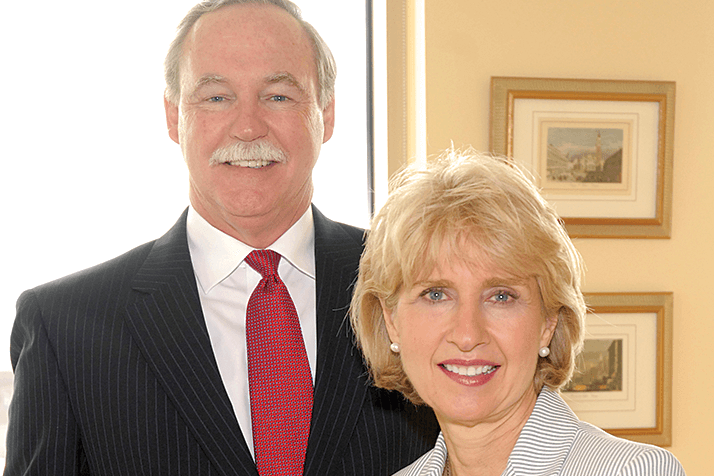
What is unique about Wills Eye Hospital? Julia Haller: Wills was the first eye hospital in the United States, the gift of a Quaker merchant called James Wills, who died in 1825 leaving his fortune to the city of Philadelphia. Part of our mission, going back to his will, is to take care of the indigent. So, while we gladly treat millionaires and people who have flown in from all over the world, our vocation is to take care of the poor and needy in our region. Joseph Bilson: It's true, no matter where you come from, if you can get to our door, we’re going to take care of you in a first-class way. I'd also say that we are uniquely busy. In addition to our main site in Center City, we have a number of ambulatory surgery centers that sit within the communities. We do close to 50,000 outpatient surgical procedures a year and top 350,000 consultations.
Does your philanthropic mission clash with the pursuit of excellence? JH: Not at all; they’re not mutually exclusive. Philanthropy is by far the major focus for us, the hospital exists to take care of the eyes of the poor. It’s not easy financially… JB: ...but we need no grants from the states or the communities—zero. Everything is paid for by our own investment, private insurance or Medicare. We have operating losses, so we do dip into some of the interest that the endowment contributes, and we do get funds donated to the hospital for the support of free care. Sometimes corporate partners donate products and supplies. It takes a lot of coordination, on our part and on the part of our supporters. Is there a huge weight of responsibility on your shoulders? JB: My hair was really dark when I started but it’s pretty grey now and I’m trying to just keep it at this point! Actually there’s a lot of energy here, and a flexibility of approach, which allows us to get a lot of things done. We helped a lot of people and that in itself is tremendously energizing. And getting the best care possible with the money that we have to spend is very satisfying. JH: I would say it’s not so much a weight of responsibility as a challenge and a privilege to help support the brilliant clinicians and scientists that we work with to eradicate blindness and visual disability.
What’s your management style? JH: I try to nurture the staff, to let them flourish. This means arranging things so that everyone can reach their full potential and take advantage of the opportunities that are open to them. That’s good for us as individuals and good for us a hospital. I try to be inclusive and collegial and collaborative and show a positive example. JB: There’s a real team environment here. Everybody feels like we’re part of one organization moving in one direction. And I think that’s why our reputation is so high. JH: We talk about “the Wills Eye family”. It’s a family-oriented, friendly place to work and we like to spend time together. Our residents know to bring a tuxedo because there are three or four black-tie events every year. We enjoy working hard and playing hard.
“Four or five children are born every week in the US with a retinoblastoma and we will treat two or three of them.”
The hospital is a known innovator, what is exciting you right now? JH: There’s just too much to talk about. I would definitely highlight ocular oncology; we have the biggest program in the world by order of the magnitude. We treat about half of all the ocular melanomas in the US. Similarly for children, where the most common cancerous ocular tumor is retinoblastoma; four or five children are born every week in the US with a retinoblastoma and we will treat two or three of them. Another topic worthy of mention is under-served minorities, such as African-Americans with glaucoma or minorities with diabetes We have a number of projects looking at ways to provide increased access to care for them. JH: I'd pick out the wellness project for students in the school system; it is a really huge project where we’re trying to provide all the children in the school district with annual eye exams and get them in glasses. To contribute maximally to academic performance, we now start seeing the kids in early elementary years.
What are your views on ophthalmology right now; is at a good place? JH: On the one hand, it couldn’t be more thrilling. It’s the most stimulating field of medicine, with some of the most exciting experiments and applications. On the other hand, there are causes for tremendous concern. In the US, we’re constrained in terms of available residency slots. It’s a huge problem in every specialty but particularly in ophthalmology as the incidence of ocular diseases rises so sharply with age. We’re very interested in working out more efficient ways of treating patients, using telemedicine for example, or employing physician’s assistants – non-doctors who can help expand and extend the ability of the individual ophthalmologist to treat more patients.
